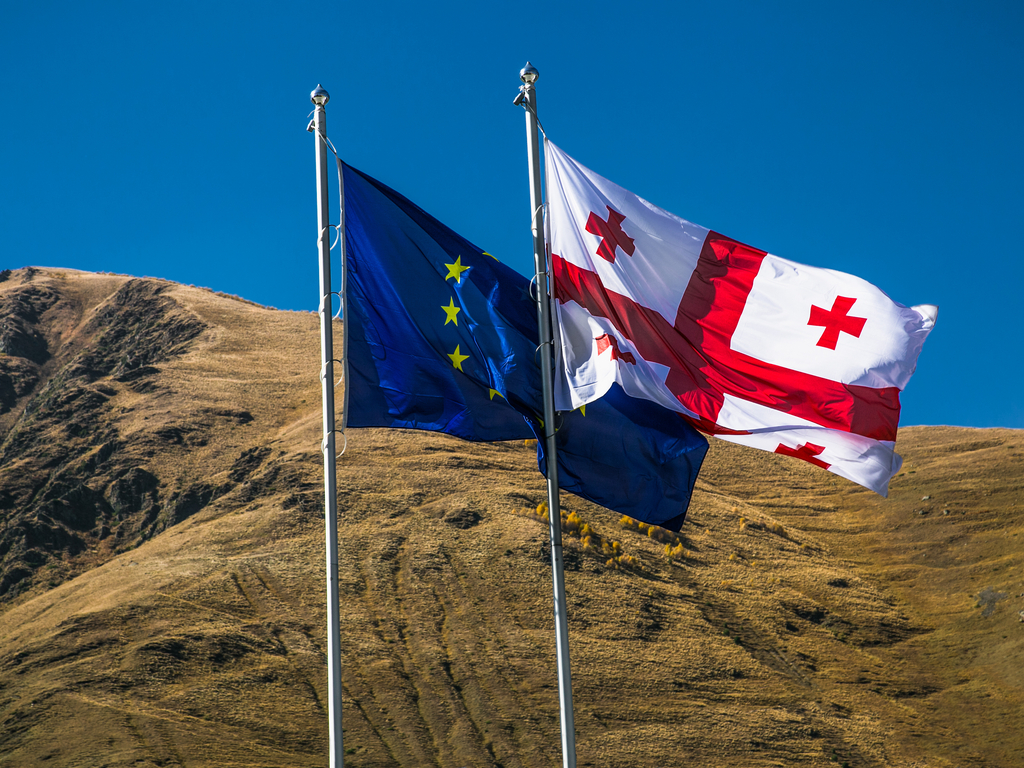Kakha Gogolashvili, a senior fellow and Director of European Studies Center at the Georgian Foundation for Strategic and International Studies
This May, foreign ministers of Ukraine, Georgia, and Moldova signed a memorandum on the establishment of the Associated Trio for the joint successful European integration of the three countries. In less than a month, on June 24th the three countries made their first joint visit to the EU institutions in Brussels in the format of the Associated Trio. In July, the Heads of State of Georgia, Republic of Moldova and Ukraine have gathered in Batumi, Georgia to strengthen the trilateral cooperation on European integration.
StrategEast has interviewed leading experts from EaP countries to find out more about the countries’ EU aspirations in light of these events.
Three EU associated states of Georgia, Moldova, Ukraine, lastly more frequently mentioned as “Associated Trio” (the term was first used by the Lithuanian MEP Andrius Kubilius), after several years of advises and pushing from side of civil society[1] have initiated a trilateral cooperation. Memorandum of Understanding signed on 17 May 2021 between the Ministries of Foreign Affairs of Georgia, Republic of Moldova and Ukraine on Establishing Enhanced Cooperation on European Integration – the “Association Trio”. Memorandum initiates enhanced cooperation and dialogue among the ministries of foreign affairs of the three EU Associated Partners, as well as with the European Union on matters of common interest related to the European integration of their countries, including cooperation within the Eastern Partnership. The cooperation format established by the “Trio” Memorandum is still far from the ambition that civil society tried to inspire in their governments. The memorandum tells little about the extension of cooperation and deep free trade regime among the Trio members themselves, but looks more towards the consultations and mutual support in their bilateral cooperation with EU.
Important step in this process marked the TRIO summit (on the presidential level) held in Batumi (Georgia), July 20, with EU participation at the highest level, namely the President of the European Council. The summit declaration once again confirmed the will of three countries to enhance and consolidate their cooperation for the sake of their joint advancement towards the EU membership. They also committed to work on “concrete priorities” in the areas of common interest to enhance political dialogue and advance economic and political integration with EU in areas of transport, green economy, digital transformation, green energy, justice and home affairs, strategic communications and health care. Progress in their relations with the EU is understood as advancement in the reform of institutions, approximation of legislations to EU Acquis. Increasing resilience of all three states is again understood in the context of their close cooperation with the EU in CSDP issues, countering hybrid threats, including cyber security, and coordination of efforts under strategic communication. The Declaration stresses that the European Integration does not have alternative for all three countries and they will stand united in achieving the goal of the recognition of the European Perspectives by the EU.
The trend is clear – TRIO is on its way for creating a real regional cooperation. The three countries have practically the same conditions in trade in goods and services with the EU as the Western Balkan (WB) states, which are largely recognized as potential and actual candidates for EU membership. Indeed, the TRIO countries have not established a similar integration model within each other and still trade based on the 1994 CIS FTA bilateral agreements. The aforementioned agreements are not deep and comprehensive and do not stipulate the removal of non-trade barriers. The AAs do not recognize a diagonal accumulation of the rules of origin between the three countries when they trade with the EU. All of three countries are cooperating among wider regional formats like GUAM[2] and BSEC[3] but none of these aforementioned formats is concentrated on the aims of integrating with the EU.
It is important not to copy existing models of cooperation as they serve different concrete objectives. The V4 and Baltic Council were primarily tasked to increase the chances for the member states to accede to the European Union and the cooperation in the Balkans is primarily to overcome the divisions and competition between the states in the region, obviously with their following integration into the EU structures. Important to mention: in all of the abovementioned cases, the creation of regional cooperation formats has been highly supported by the EU and has contributed significantly to consolidation of the European integration process. In the case of the TRIO, the integration should aim at the construction of a “regional block” of countries with shared aspirations, priorities and challenges. For this aim, the aforementioned countries should develop connectivity, transport and communication infrastructure with each other, good cooperation in the sphere of culture, education and science, and cooperation between businesses in different industries. However, main three pillars of cooperation and mutual support within a such a regional block should be – democracy building, trade and security.
[1] December 2019, civil society platforms of three associated countries, signed a memorandum on cooperation whose aim was to push the governments to establish a regional cooperation (similar to the Visegrad-4 format) to mutually support and coordinate the work on European integration, deepen trade and political cooperation, including on issues of security and sectoral cooperation.
[2] GUAM – “Georgia, Ukraine, Moldova, Azerbaijan” is a regional cooperation organization.
[3] Black Sea Economic Cooperation – a regional international organization involving (as full members) 12 countries of the Wider Black Sea Region.




